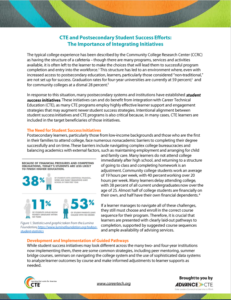The Connecticut State Department of Education has named Kyllie Freeman as the State Director of Career Technical Education. The Department oversees all secondary and postsecondary Career Technical Education (CTE) programs as well as CTE for justice-connected individuals and youth and pre-apprenticeship programs.
 Kyllie discovered her passion for CTE in the classroom as a culinary instructor of 15 years and fondly recalls seeing her high school learners’ “faces [light up] when they made something” as they gained valuable skills in her classes. “Some [learners] hadn’t even washed a dish before.”
Kyllie discovered her passion for CTE in the classroom as a culinary instructor of 15 years and fondly recalls seeing her high school learners’ “faces [light up] when they made something” as they gained valuable skills in her classes. “Some [learners] hadn’t even washed a dish before.”
Originally a nutritionist major in college, Kyllie switched to culinary arts to continue a career connected to food and nutrition without the intense focus on math and science. During her teaching tenure, Kyllie worked on her district’s grant for the Strengthening Career Technical Education for the 21st Century Act (Perkins V) which led to her taking a Perkins Grant Manager role at the state level. Kyllie oversaw the Hospitality and Tourism and the Information Technology, Education and Training Clusters®, explaining “I wanted to keep supporting Perkins but in a different role. ”
In her new role as State Director, Kyllie is excited to increase partnerships, aligning school districts, community colleges and industry partners to increase accessibility to high-quality CTE and success for learners across Connecticut.
In the year ahead, Kyllie is focused on supporting districts by remapping CTE School Courses for the Exchange of Data (SCED) codes to better align with the National Career Clusters Framework®, giving districts more flexibility in how they award credit. Kyllie is excited to offer technical assistance to district administrators to facilitate this process.
Kyllie is also focused on helping learners know more about the college and career opportunities available to them through CTE. She plans to accomplish this by better aligning course selection with learner interests. Kyllie will also support learners by updating the Student Success Plan and embedding CTE into the plan for better alignment with the opportunities available to learners.
One of the biggest challenges for CTE in Connecticut, teacher recruitment and retention, is not unique to the state; it is a national issue. The availability of qualified teachers in a particular pathway dictates where certain courses can be offered, thereby limiting course offerings for learners where teachers are in short supply.
In addition to addressing the top challenge of CTE instructor recruitment and retention, an issue facing CTE programs nationwide, Kyllie would also like to help change the perception of who should be participating in CTE. This shift would raise awareness that learners should be focused on college and career readiness, not just readiness for college. “CTE is huge and so many [skills] are transferrable.”
Coming from a long line of restaurant owners, Kyllie loves cooking outside of her State Director role. While she will “cook anything,” Kyllie enjoys cooking Italian food the most. Outside of the kitchen, Kyllie enjoys kayaking.
Welcome Kyllie to Advance CTE!
Jodi Langellotti, Communications Associate


 In response to these results, many community colleges have worked with national organizations like CCRC and the American Association of Community Colleges, among others, to develop student success initiatives, focused on increasing equity and degree completion. These initiatives include numerous reforms of college advising and student support services to ensure that postsecondary learners undergo a seamless journey throughout their experience and complete college with a meaningful degree.
In response to these results, many community colleges have worked with national organizations like CCRC and the American Association of Community Colleges, among others, to develop student success initiatives, focused on increasing equity and degree completion. These initiatives include numerous reforms of college advising and student support services to ensure that postsecondary learners undergo a seamless journey throughout their experience and complete college with a meaningful degree.